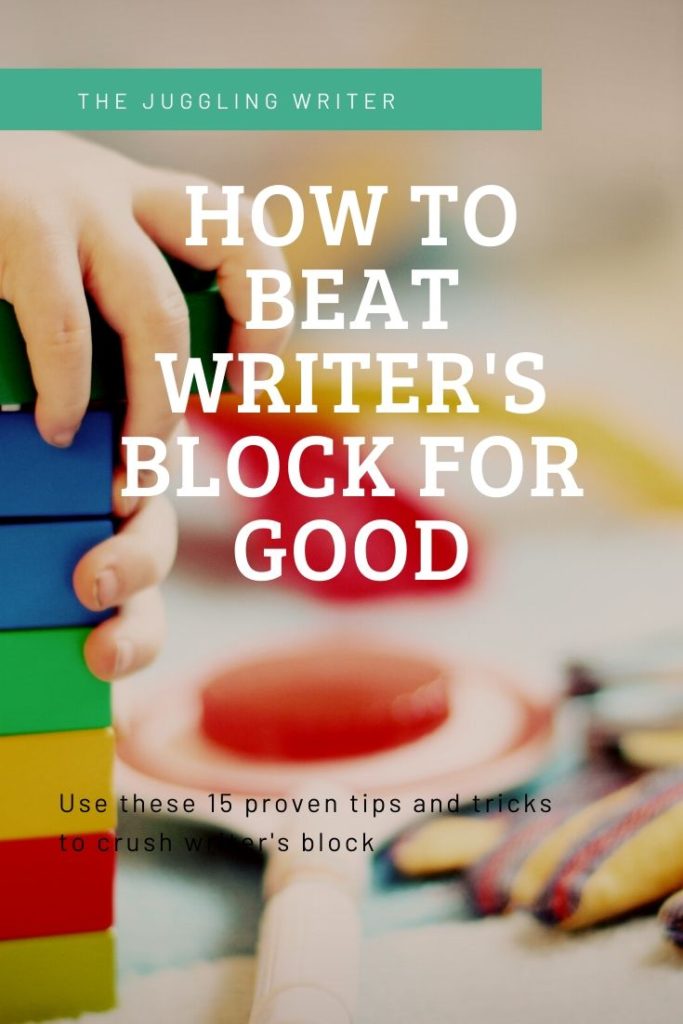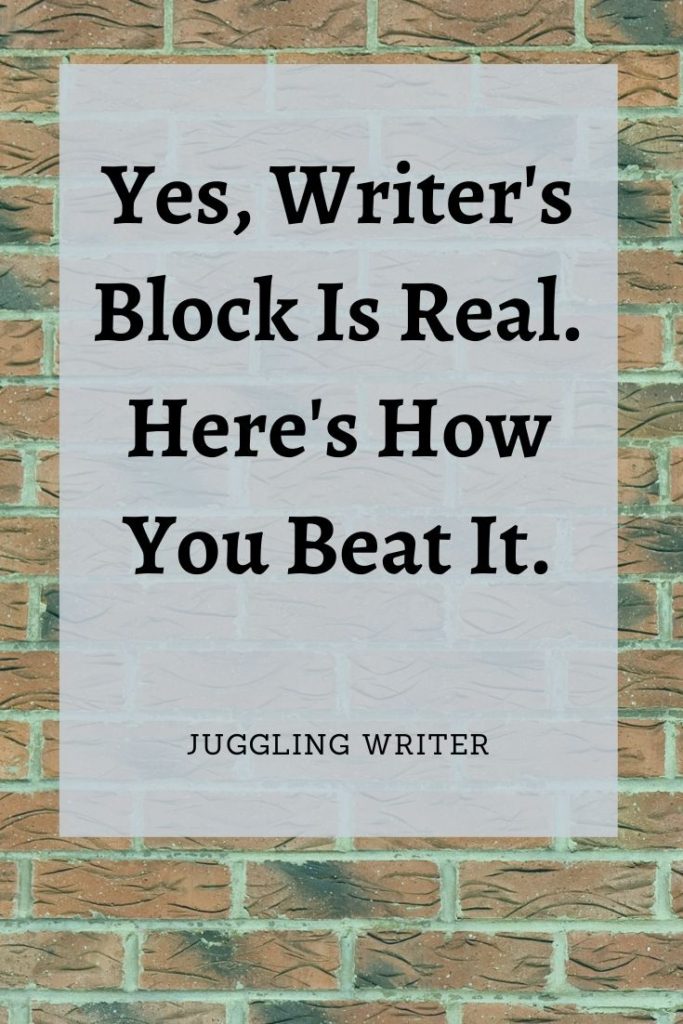Last Updated on July 7, 2024 by Nathaniel Tower
Whether you’re a brand new writer or a seasoned veteran with a handful of bestsellers to your name, there’s one thing that’s inevitable: writer’s block.
Every writer struggles with writer’s block. Even great writers deal with this dreaded condition. Whether you’re writing for work or pleasure, writer’s block can set in at nearly any time and wreck your productivity. When it happens, it can make even the best writers feel completely helpless. Fortunately, there are quite a few ways you can overcome writer’s block.
What is writer’s block?
Before we dive into the ways to beat writer’s block, let’s clearly define what writer’s block is.
Simply put, writer’s block is the inability to write productively.
Here are two primary symptoms of writer’s block:
- You can’t come up with anything to write. You just sit in front of a blank page and can’t physically writer anything.
- You can write words, but they aren’t satisfactory or don’t fit together cohesively to form the piece you want to write.
In other words, writer’s block prevents you from getting the task of writing done. It doesn’t mean you aren’t trying, nor does it mean you’ve lost your skills as a writer. It means your ability to write is being hindered by some internal or external force. Whether this is a mental obstacle or physical barrier will depend on your exact circumstances. Either way, writer’s block affects every writer and can have a dramatic impact on your production.
Writer’s block can be especially frustrating for writers who have limited time on their hands. If you have a full-time job along with parenting duties, writer’s block can be a crippling experience that makes you question whether you even want to write at all. Just imagine: after a long day of work and parenting, you finally sit down to write only to have nothing come out.
What causes writer’s block?
Writer’s block can occur for many different reasons, and it can vary from day to day. You might have the best writing session of your life on Sunday and then come back on Monday with a dozen things that prevent you from writing.
Here are a few of the most common reasons writers experience the inability to write:
- Mental fatigue – Your brain is too exhausted to get the right words out.
- Tiredness/sleepiness – Your body is too physically tired to write.
- Lack of motivation – You don’t really want to write.
- Lack of a good idea – You have nothing to write about (or what you’re trying to write about isn’t very good).
- Distraction – Your mind and/or body is constantly wandering to other things.
- Doubt – You don’t think you can be a writer.
- Self-criticism – You don’t think what you’re writing is good enough.
- Sense of failure – You feel like you haven’t succeeded as a writer up to this point, so you don’t think it’s worth trying.
- Lack of routine or organization – Your writing habits are too messy and prevent you from writing.
None of these things mean you aren’t a good writer. They are temporary obstacles that you can overcome with the right routine and positive thinking.
Before you can determine the best writer’s block tip, you need to understand the cause of your writer’s block.
Is writer’s block a myth?
Some writers swear that writer’s block isn’t a real thing. They call it an excuse. While there are some writers who never seem to experience this phenomenon, it’s certainly not a myth. The inability to perform has been well-documented in many different walks of life, including writing. Saying it’s just a myth won’t help you overcome it. Understanding the root cause of your writer’s block and trying proven methods for beating it will get you writing again.
17 easy tips to overcome writer’s block
A lot of lists of writer’s block tips consist of a bunch of things you should write instead of whatever you are trying to write. However, when you are experiencing writer’s block, you sometimes can’t write at all. The tips below primarily focus on things to do outside of writing that will help you get back in the writing mood.

When writer’s block sets in, don’t sit there for hours trying to force yourself to beat it. Instead try one or more of these tips from expert writers to beat it.
1. Reread the best thing you’ve written
Looking at something great you’ve created can inspire you and remind you that you can do this. If you’ve been published in print, grab a copy of that book or magazine and read your own work out loud to yourself. Take joy in your own great writing. You are a writer, and you will beat this!
2. Read a chapter from your favorite book
The words of others often inspire us to write. Pick up your favorite book and devour those amazing words. As you read, think about what the author did to make you love this writing so much. Put yourself in that author’s mind and try to imagine what writing this book must have been like. Make sure to limit yourself to a single chapter so your writing session doesn’t turn into a reading session.
3. Listen to a favorite song
It doesn’t matter if it’s classical, The Beatles, heavy metal, or a guilty-pleasure pop song. Listening to one of your favorite songs will put you in a happy place that makes you forget about the fact that you can’t write. And when you’re in a better mood, you can often be more productive with your writing. Try one of the best albums to listen to while you write.
4. Have a snack
If you’re too hungry or thirsty, it might be your stomach that’s keeping you from writing. Get yourself a nice little snack. Don’t stuff yourself full or chug a bunch of booze, but give yourself enough to keep those hunger pangs away. While some writers swear they write better when drunk, you shouldn’t try to incorporate a lot of alcohol into your routine to beat writer’s block. It might leave you with a headache or render you unable to write at all.
5. Go for a walk or a run
Inspiration often comes when you’re exercising, especially if you’re doing it outdoors. As you get a little sweaty, take the time to get lost in the world around you and let that be your inspiration to write. Just be careful not to run too fast or you might forget to think or wear yourself out and leave yourself too tired to write later.
6. Phone a friend
Having a conversation with a friend, especially another writer, can inspire you to write something. It’s okay to talk about your writer’s block, but that doesn’t have to be the center of your conversation. Chances are, your friend has had writer’s block before, so you might be able to get some additional advice. But this is also a time to connect and focus on things other than not being able to write.
7. Turn off your phone
The famous writers of yesteryear had it easy. They didn’t have an endless string of distractions at their fingertips. A smartphone is an absolute curse for writer’s block. You’re better off not even having your phone around when you’re writing.
8. Meditate
Sometimes we can’t write because our minds are too busy or because our minds and bodies are exhausted. Meditating can help this all melt away. Put yourself in a quiet space with no distractions, close your eyes, and just focus on your breathing. Don’t try to think about anything. This isn’t the time for you to create writing ideas. Just relax.
9. Eliminate temptation by locking down your computer
Temptation exists everywhere. You’ve already turned off your phone, but your computer gives you millions of options other than writing. Fortunately, there are lots of tools available to help you eliminate these distractions without switching to a typewriter. A few of the best tools are:
Or you could always just try using pen and paper instead of your computer. I often beat writer’s block simply by switching to a trusty old notebook.
10. Offer yourself a reward
It’s okay to motivate yourself to write with a tangible reward. Use something you’ve wanted to buy for a while as your motivation. If you can get through this writing session successfully, then you can purchase something from your Amazon wishlist. But don’t use this trick too often or you might go broke!
11. Take a break
One trick for when you can’t sleep is to get out of bed for a bit. Try this same approach when you have writer’s block. Instead of sitting at your writing station, get up and do something else for 15 minutes. Fold laundry. Do jumping jacks. Organize your sock drawer. Whatever you do during the break, keep it relatively mundane. If it’s boring enough, you won’t be able to contain your writing excitement when you get back to it. And when time is up, make sure you get back to your writing environment with no excuses.
Most writers feel like they have to write every day, but sometimes it helps to take a day or two off instead. Don’t just sit there staring at a blank page or screen. If nothing is coming to you, don’t try to force it.
12. Do a brain exercise
Sometimes your writer’s block comes from lack of mental stimulation. You need to flip the brain on to get writing. By doing a quick brain exercise such as a brain teaser, a puzzle, etc., you can motivate your brain to come up with the power to write.
13. Stop trying to be perfect
This is especially applicable if you are in the drafting phase, but it can work for any writing session. A lot of our writer’s block comes from only wanting to write the perfect words and not wanting to make any mistakes. Accept that you won’t be perfect every time you write and just get your thoughts out on the page. Remember, you can always edit them later.
14. Think positive
Since doubt and self-criticism are two major causes of writer’s block, it’s important to remind yourself that you can do this. Instead of focusing on how you can’t write at the moment, think of all the good things you’ve accomplished. You don’t have to focus solely on writing. Just take a few minutes and only let positive thoughts enter your mind. Then turn back to your computer and start to write.
Having trouble developing a positive attitude about your writing? Chance are you’re already a good writer, so now it’s up to you to believe it!
15. Write something else instead
As I mentioned at the top of this list, most of these tips encourage you to do something besides write. Those tips are especially helpful when you find yourself completely unable to write. In some cases, writing something else will work wonders. When the words aren’t flowing on the manuscript or document you’re trying to write, then shift gears and write something else.
It often helps to write something that doesn’t require as much energy to get you started. For example, if you can’t get anything out for your novel, just write a paragraph about your day. Or even just write a list. This is a great trick to use when you really want to write but can’t will yourself to write the task at hand. Sometimes the simplest way to overcome writer’s block is simply by writing!
Here are some things you can try writing instead when writer’s block hits:
- A paragraph about your day
- An outline for your next story or piece
- A list of your favorite things to write about
- A list of your goals as a writer
- A goofy story that’s fun to write but doesn’t take much thought
- A simple writing exercise
- Pretty much anything else that’s easy to write and can build your confidence while taking your mind off your temporary failures
- If you prefer a more challenging writing exercise to break out of your writer’s block, try one of these great short story ideas
While not every trick is guaranteed to work every time, these tips are proven to get writers of all levels back in the flow of a great writing session.
16. Set deadlines
Setting a deadline can be an effective way to beat writer’s block because it forces you to sit down and write. When using deadlines to beat writer’s block, make sure your deadline is real, and find a way to enforce it. What happens if you don’t meet the deadline. There needs to be a real consequence.
Mark the deadline on your calendar and make sure that deadline is clearly visible whether you’re writing or not.
17. Get some help from artificial intelligence
I’m not a big proponent of using AI writing tools to do your writing for you, but they can help you generate some ideas. If you’re completely stuck and just can’t figure out a way to move forward with your writing, give an AI tool like ChatGPT a shot. Just make sure you use it as a tool and don’t let it do your writing for you.
Bonus tips to beat writer’s block
If the 17 steps above don’t help you beat writer’s block, then here are a couple more ideas that could work:
Try a writing prompt – there are hundreds of great writing prompts or short story ideas that can help stimulate your brain into writing something great.
Test an AI-writing tool – AI, or artificial intelligence, writing is on the rise. While I’m not a big fan of AI-writing tools for a variety of reasons, they can help you overcome writer’s block by giving you some good ideas. Seeing what an AI writer produces can also make you more confident in your own writing!
Things that make writer’s block worse
If you are experiencing writer’s block, avoid the following things that might make it worse:
- Staring at a blank document on your computer screen
- Forcing yourself to keep working on the same thing
- Scrolling through Facebook or Instagram
- Doing anything on your phone
- Watching TV
- Doubting yourself
- Thinking negative thoughts about your writing
- Ignoring the root causes of your writer’s block
- Telling yourself that writer’s block isn’t real
- Waiting for inspiration to hit
None of these things are likely to get you into the mood to write, and several of them can be destructive to your writing habits. Always think positive and be proactive about getting back your motivation. It isn’t going to come to you if you just sit there.
Final thoughts on beating writer’s block
Remember, different things work for different writers. When you experience writer’s block, you should try different approaches to see what works best for you. What works one day might not be effective the next day, so don’t get stuck on one method.
The best approach for beating writer’s block is to start using one of these tips as soon as you feel writer’s block set in. The sooner you beat it, the more productive your writing session will be.
What are your tips for beating writer’s block? Share your secrets in the comments. And don’t forget to share this post on all your favorite channels.
How to Get Over Writer’s Block FAQs
How do you get over writer's block?
Getting over writer’s block can be as simple as walking away from your writing space for a bit or trying to write anything else, even if it’s not perfect or not what you wanted to write. There are lots of different tips and tricks you can try to get over writer’s block. The important thing is to find out what works for you and stick with it.
What causes writer's block?
Writer’s block can be caused by a lot of different things. You might be too tired or too distracted. You might be having a bad day. You might be trying to write something that isn’t good enough or doesn’t motivate you. Or you might just be doubting your abilities. When you are experiencing writer’s block, it’s important to figure out why and then find a method that will help you beat it.
How long does writer's block last?
Writer’s block can last as long as you allow it to last. It could be hours, days, or even weeks. Writer’s block will never be permanent unless you let it be. The sooner you address the core issue, the sooner you’ll be able to find a method that works to get you writing again.
Is writer's block a real thing?
Yes, writer’s block is a real thing that affects nearly every writer at some point in their career. Although some people claim writer’s block is a myth, it’s an actual physical or mental barrier that prevents you from being able to write in a given moment. Fortunately, there are many things you can do to overcome writer’s block.



Exactly what I needed to read today. Thank you!
Great article.